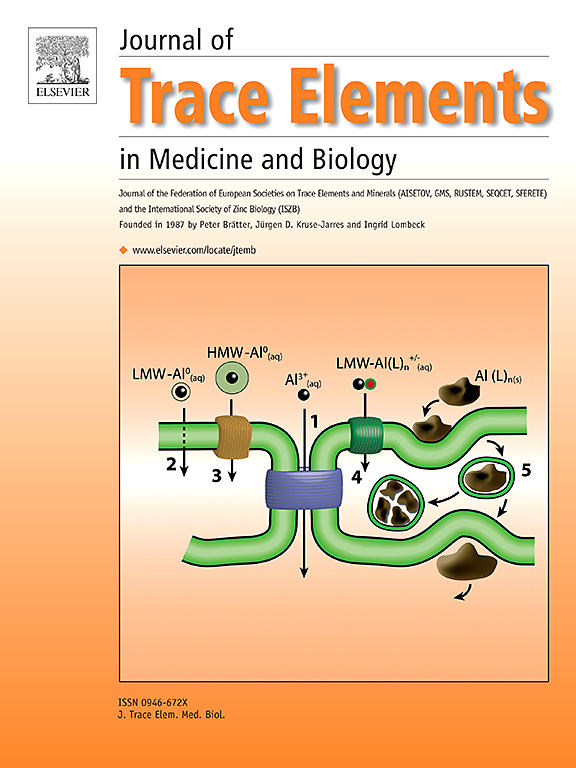补充铬对超重和肥胖患者心脏代谢危险因素的影响。随机对照试验的系统评价和荟萃分析
IF 3.6
3区 医学
Q2 BIOCHEMISTRY & MOLECULAR BIOLOGY
Journal of Trace Elements in Medicine and Biology
Pub Date : 2025-04-12
DOI:10.1016/j.jtemb.2025.127645
引用次数: 0
摘要
目的评价补充铬对心血管代谢危险因素(包括血脂、血糖指数、人体测量因子、血压和肝功能)的影响。方法通过PubMed、Scopus、Web of Science等电子数据库检索到截至2024年3月的相关研究。使用干预组和对照组的平均变化和标准差计算总体效应大小。采用I2统计量和Cochran’s q检验来确定异质性的存在。非线性模型探讨了异质性、剂量-反应关系和铬补充的总体影响。结果共纳入20项试验,干预措施1 ~ 137人。添加铬显著降低空腹血糖(FBG) ([WMD]:−1.60 mg/dl;95 % [ci]:−3.28,0.07;p = 0.06)和A1C ([WMD]:−0.05 %;95 % [ci]:−0.19,0.07;p = 0.38)HOMO-IR ([WMD]:−0.26;95 % [ci]: 0.48,−0.03;p = 0.02)和胰岛素([WMD]:−12.55 pmol/l;95 % [ci]:−23.62,−1.47;P = 0.02),脂质谱和人体测量值略有下降。然而,与其他组相比,铬组的一些因素略有升高,包括:HDL, ALT,收缩压(SBP)和舒张压(DBP)。结论本试验结果表明,添加铬对血糖控制及体重、BMI、收缩压、舒张压、甘油三酯、腰围等指标均有积极作用,并对提高肝酶水平有有效作用。本文章由计算机程序翻译,如有差异,请以英文原文为准。
The effect of chromium supplementation on cardio-metabolic risk factors in overweight and obese patients. A systematic review and meta-analysis of randomized controlled trial
Objective
This study was conducted with the aim of evaluating the effect of chromium supplementation on cardiovascular-metabolic risk factors including lipid profile, glycemic index, anthropometric factors, blood pressure and liver function.
Methods
Relevant studies were identified through electronic database searches (PubMed, Scopus, Web of Science) up to March 2024. The overall effect size was calculated using the mean changes and standard deviations for the intervention and control groups. The I2 statistic and Cochran's Q-test were used to determine the existence of heterogeneity. A non-linear modeling explored heterogeneity, dose-response relationships, and the overall impact of Chromium supplementation.
Results
Twenty trials, with interventions ranging from 1 to 137 participant were included. Chromium supplementation significantly reduced Fasting blood glucose (FBG) ([WMD]: −1.60 mg/dl; 95 % [CI]: −3.28, 0.07; p = 0.06) and A1C ([WMD]: −0.05 %; 95 % [CI]: −0.19, 0.07; p = 0.38) HOMO-IR ([WMD]: −0.26; 95 % [CI]: 0.48, −0.03; p = 0.02) and insulin ([WMD]: −12.55 pmol/l; 95 % [CI]: −23.62, −1.47; p = 0.02) and a slight decrease in lipid profiles and anthropometric measures. However, there were some factors that Chromium was slightly increased compared to other groups, including: HDL, ALT, Systolic Blood Pressure (SBP) and Diastolic Blood Pressure (DBP). Chromium has no significant effect on AST.
Conclusion
The results of this experiment show that chromium supplementation had a positive effect on blood sugar control and various factors including weight, BMI, SBP, DBP, triglycerides, and waist circumference, and had an effective role in improving the level of liver enzymes.
求助全文
通过发布文献求助,成功后即可免费获取论文全文。
去求助
来源期刊
CiteScore
6.60
自引率
2.90%
发文量
202
审稿时长
85 days
期刊介绍:
The journal provides the reader with a thorough description of theoretical and applied aspects of trace elements in medicine and biology and is devoted to the advancement of scientific knowledge about trace elements and trace element species. Trace elements play essential roles in the maintenance of physiological processes. During the last decades there has been a great deal of scientific investigation about the function and binding of trace elements. The Journal of Trace Elements in Medicine and Biology focuses on the description and dissemination of scientific results concerning the role of trace elements with respect to their mode of action in health and disease and nutritional importance. Progress in the knowledge of the biological role of trace elements depends, however, on advances in trace elements chemistry. Thus the Journal of Trace Elements in Medicine and Biology will include only those papers that base their results on proven analytical methods.
Also, we only publish those articles in which the quality assurance regarding the execution of experiments and achievement of results is guaranteed.

 求助内容:
求助内容: 应助结果提醒方式:
应助结果提醒方式:


